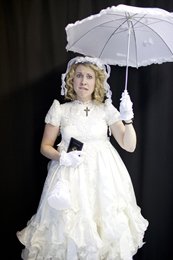Holy Mary, Eoin Colfer’s 55-minute piece, deals with the perennial themes of Catholicism and bullying. It explores territory so wonderfully worked in Frank O’Connor’s 'First Confession'. The fear and apprehension around sin and guilt, confession, and penance are all there. Colfer does particularly well in capturing the child’s confused management of catechism and church-speak. He offers a gentle, if belated, send-up of the pomp and mystery of ritual, while steering well clear of the topical issue of .jpg.aspx%3Fwidth=180&height=216) clerical abuse. This is pre-Murphy Report, dated in a charming manner, signified by the dial-up telephone in the presbytery. Colfer restores kindness to the priesthood: his Fr. Ibar is like the young cleric in O’Connor’s story; Mary’s perceptions are those of a seven-year-old, and Colfer is well attuned to the innocence and ignorance in her idiom.
clerical abuse. This is pre-Murphy Report, dated in a charming manner, signified by the dial-up telephone in the presbytery. Colfer restores kindness to the priesthood: his Fr. Ibar is like the young cleric in O’Connor’s story; Mary’s perceptions are those of a seven-year-old, and Colfer is well attuned to the innocence and ignorance in her idiom.
The other thread running through the play is that of bullying among the girls, who display an enormous capacity for cruelty, delivered with verbal creativity and through a repeated mantra of children’s rhyme. Majella Barnes, like the venomous sister in O’Connor, is Mary’s nemesis. She can rhyme for the devil, driving her foe to distraction with rhymes that draw on ‘knickers’, ‘hairy’ and ‘Mary’. Bullying, according to the Department of Education & Skills, is about ‘repeated physical, verbal or psychological aggression’ and Majella is indefatigable and tenacious in her malice. Colfer finds a way to drive this point home through both laughter and tears.
This is a play aimed at adults and children from eight upwards. It leans towards a form of humanitarian morality. Bullies have to learn the error of their ways; the victims have to learn to turn the other cheek and acquire the skills of assertiveness. Colfer suggests the need for adults to be aware and to intervene. Then goodness (with a residual degree of mischief that tempers the sentimentality of the reconciliation) will prevail. Majella and Mary reach a truce of sorts, allied now with a wicked eye for the weakness in others, but Mary – maybe not quite so ‘holy’ anymore – is waiting her moment to strike.
 This is a two-hander. Aileen Mythen plays Mary in a vivid, concentrated way. She becomes the child as a complex, emotional creature, who has to come to terms with her fears and to understand the adult world (her mother has been deserted by a ne’er do well father). Mythen is a great testimony to the power of live theatre: She is much more convincing live than she is in the poster photo which is too precocious, too much of an impersonation (grown woman pretending to be little girl). On-stage, her acting is captivating.
This is a two-hander. Aileen Mythen plays Mary in a vivid, concentrated way. She becomes the child as a complex, emotional creature, who has to come to terms with her fears and to understand the adult world (her mother has been deserted by a ne’er do well father). Mythen is a great testimony to the power of live theatre: She is much more convincing live than she is in the poster photo which is too precocious, too much of an impersonation (grown woman pretending to be little girl). On-stage, her acting is captivating.
The other ‘hand’ is Iseult Golden, who is versatility personified, taking on teacher, mother, bully and priest with an effective economy of gesture, tone and costume.
Under Liam Halligan’s direction, both actors maintain a hectic pace of narrative, reminiscent of Storytellers’ style, and an energetic flow to the action. Marcus Costello provides minimal, effective set and lighting design and Denis Clohessy contributes a haunting soundscape.
As a highly compact piece of theatre, this is a production that could fit in a laundry basket and it could certainly achieve a life after this tour if Black Stair developed an educational pack to accompany it and took it on the road to any number of primary schools, where it could evoke laughter and lively responses.
Derek West has reviewed theatre for 25 years. He also edits publications for NAPD, the school principals’ national organisation.